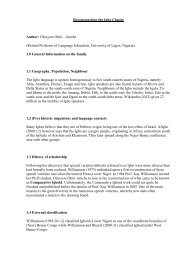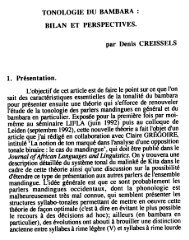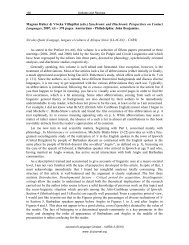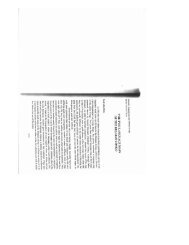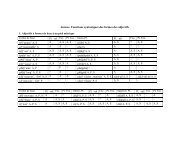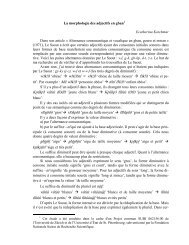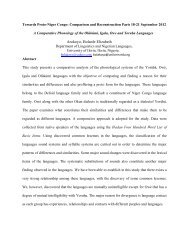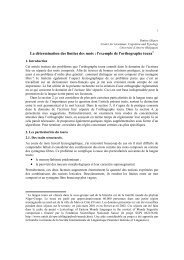1 A LINGUIST'S FIELD NOTES INTRODUCTION ... - Llacan - CNRS
1 A LINGUIST'S FIELD NOTES INTRODUCTION ... - Llacan - CNRS
1 A LINGUIST'S FIELD NOTES INTRODUCTION ... - Llacan - CNRS
Create successful ePaper yourself
Turn your PDF publications into a flip-book with our unique Google optimized e-Paper software.
lighting up intensely trees, mud villages and men hurrying to take shelter from the<br />
tornado that makes boubous flap violently.<br />
Now the rain is beating hard on the car. We find Azare almost deserted with only a<br />
few children hopping in the puddles formed by the hard driving rain. There’s no-one to<br />
ask for direction. We go round and round under the heavy rain in this little town planted<br />
around a cross-roads right in the middle of the plain.<br />
We end up in a small hotel, the Central Hotel, where I rent a tiny room : toilet,<br />
sagging bed, some arm-chairs, a little table, the whole thing sombre and not very clean.<br />
I take my rest there while waiting for the storm to stop. An hour later, the storm has<br />
ended. Drops of rain continue to fall on the town as a strong stench of humus rises from<br />
the ground. The earth sprouts again and holds its shoots towards a trembling light of the<br />
early morning sun. Here I am at last in Azare, in Bauchi State, to meet Emmanuel Ali,<br />
a Zaar speaker and an English teacher in a Teachers’ Training College.<br />
IN SEARCH OF EMMANUEL ALI<br />
A year earlier, I had been recruited to participate in a project to draw the map of the<br />
dialects of Hausa, a national language spoken over a wide area. The contacts I had made<br />
over the years with my Hausa colleagues whose collaboration was indispensable to me<br />
had made me doubt the feasibility of this study. Therefore, even before arriving in<br />
Nigeria, I started looking for another project as an alternative to the Hausa project,<br />
should it fail to take off. In fact, my Nigerian Hausaist colleagues, if they did not<br />
abandon the university for journalism, senior administrative posts or the bank, spent all<br />
their energy trying to survive from day to day in a continent that looks down on its<br />
intellectuals. What strength would they have for linguistics?<br />
I had therefore sought the opinion of Chadicist colleagues working in Europe or the<br />
USA, asking them the question : On which Chadic language not yet described should<br />
one work as a matter of priority in Nigeria? Without exception, everyone pointed to<br />
Zaar, the language accounting for the greatest number of speakers among those that<br />
constitute the West-B-III sub-branch of Chadic languages. In fact, there was very little<br />
information about this group of languages, also called «Bauchi-South». This latter<br />
name arises from the name of the part of the state where these languages are spoken. I<br />
2


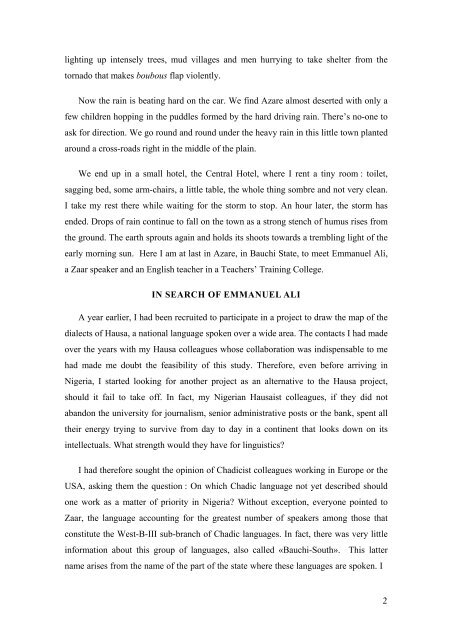
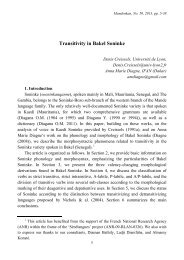
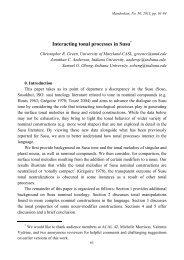
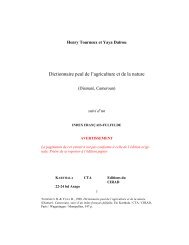
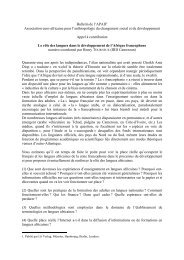

![[halshs-00645129, v1] Depressor consonants in Geji - Llacan - CNRS](https://img.yumpu.com/17832391/1/190x245/halshs-00645129-v1-depressor-consonants-in-geji-llacan-cnrs.jpg?quality=85)
